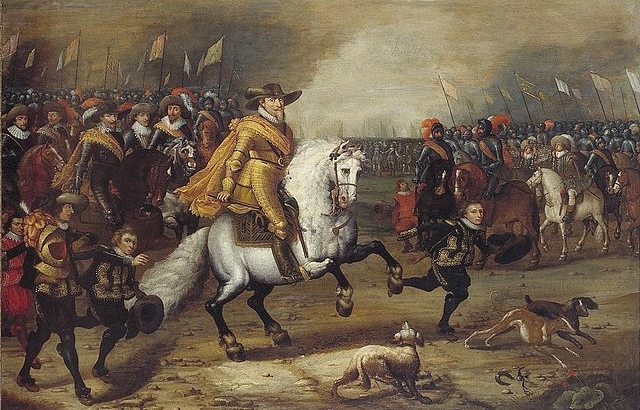Flexibility to Act Without Violating the U.S. Constitution: America’s Founders Discuss History of Policy Vices Within the United Netherlands
In Federalist No. 20, James Madison (with Alexander Hamilton) discusses the vices of the constitution of the United Netherlands. The United Provinces of the Netherlands, sometimes called the Dutch Republic, consisted of seven republics and was established through the Union of Utrecht in 1588. After decades of bloody religious wars, the sovereignty of the United Provinces was officially recognized with the Peace of Westphalia in 1648, but the union collapsed in 1795 during the Batavian Revolution.
In theory, Madison observes, the constitution of the United Netherlands seems to have successfully combined effective executive power with republican representation in a legislative body. “The sovereignty of the Union,” Madison writes, “is represented by the States General, consisting usually of about 50 deputies appointed by the provinces.”[1] The States General has well-defined powers and responsibilities – including the power to make treaties, to make war or peace, to raise armies and equip fleets, and to demand quotas of contribution from the provinces – and the individual provinces are restrained from engaging in certain actions that are deleterious to the other provinces or to the Union as a whole.
“The executive magistrate of the Union is the Stadtholder,” Madison continues, “who is now a hereditary Prince.”[2] Each of the seven provinces was led by a stadtholder, but the offices eventually became hereditary and, in time, the Prince of Orange came to hold most or all of the individual stadtholderships. The Stadtholder of the union was given many powers and prerogatives, including the power to settle disputes between provinces, and to command the federal troops and navy.
The United Provinces of the Netherlands, “as delineated on parchment,” seemed to have struck a form that balances popular representation with an energetic executive. “What are the characters which practice has stampt upon it?” Madison asks. “Imbecility in the government; discord among the provinces; foreign influence and indignities; a precarious existence in peace, and peculiar calamities from war.” The first vice of the constitution of the United Provinces is that there is a nearly constant tension between the different aims and policies of the States General – which wants to preserve the republican nature of the government – and the Stadtholder, with his ties to wealth and other monarchical powers in Europe. In fact, Madison writes, the authority of the Stadtholder arises mainly “from his great patrimonial estates [and] from his family connections with some of the chief potentates of Europe.”[3] This tension between the foundations and objects of the Stadtholder and States General had led to frequent disagreements and conflicting policies between the two departments over commercial affairs and defense policies.
The second vice of the union is that the States General, though vested with general legislative authority, requires “unanimity and the sanction of their constituents” for the enactment of all policies and laws. Although the unanimity requirement arose from an assumed equality of the seven provinces, and a desire to protect the provincial interests of each, it had led to two further difficulties. First, the unanimity requirement meant that a single deputy in the States General could veto measures necessary for the good of the whole union. “The Union of Utrecht,” Madison writes, “reposes an authority in the States General seemingly sufficient to secure harmony, but the jealousy in each province renders the practice very different from the theory.”[4] The second difficulty this produces is that in times of great and urgent emergencies, the States General and the Stadtholder frequently violated the constitution by ignoring the rule of unanimity. A constitution that, of necessity, is frequently violated, Madison suggests, is fundamentally flawed and in need of improvement.
The Articles of Confederation, which governed the union of American states prior to the Constitution, suffered from this second vice in some important ways. The unanimous consent of all the state legislatures and state delegations in Congress was required for all amendments to the Articles of Confederation. In the Confederation Congress, supermajorities (nine out of thirteen state delegations) were required for Congress to raise revenues, make treaties, and do other things necessary for the good of the American Union. The Federalists defended the new Constitution’s ability to remedy these potentially deadly defects: the requirements for ratifying and amending the Constitution were reduced from unanimity to a supermajority of state conventions; furthermore, all acts of Congress under the new Constitution would require only a majority vote of both houses of Congress. This last improvement especially makes it less likely that the federal government would need to violate the Constitution to take necessary actions in times of crisis, as the United Netherlands had done on numerous occasions. This problem is further mitigated by the independence and discretion of the president to take certain actions in times of crisis without prior authorization from Congress; it is further mitigated by the fact that there are implied powers in the Constitution, as indicated by the necessary and proper clause in Article II. These improvements would give the federal government a degree of flexibility to better fulfill its responsibilities, especially with regard to national security, without the need to undermine the sanctity of the Constitution by frequent violations.
 Christopher C. Burkett is Associate Professor of History and Political Science, and Director of the Ashbrook Scholar Program at Ashland University.
Christopher C. Burkett is Associate Professor of History and Political Science, and Director of the Ashbrook Scholar Program at Ashland University.
[1] The Federalist No. 20
[2] The Federalist No. 20
[3] The Federalist No. 20
[4] The Federalist No. 20
Click here for American Exceptionalism Revealed 90-Day Study Schedule
Click here to receive our Daily 90-Day Study Essay emailed directly to your inbox

 https://en.wikipedia.org/wiki/Eighty_Years%27_War#/media/File:Maurits_(1567-1625),_prins_van_Oranje,_in_de_slag_bij_Nieuwpoort_(1600).jpg
https://en.wikipedia.org/wiki/Eighty_Years%27_War#/media/File:Maurits_(1567-1625),_prins_van_Oranje,_in_de_slag_bij_Nieuwpoort_(1600).jpg https://en.wikipedia.org/wiki/Eighty_Years%27_War#/media/File:Veen01.jpg
https://en.wikipedia.org/wiki/Eighty_Years%27_War#/media/File:Veen01.jpg https://en.wikipedia.org/wiki/Utrecht#/media/File:Lambert_de_Hondt_(II)_-_The_Surrender_of_Utrecht.jpg
https://en.wikipedia.org/wiki/Utrecht#/media/File:Lambert_de_Hondt_(II)_-_The_Surrender_of_Utrecht.jpg
Join the discussion! Post your comments below.
Your feedback and insights are welcome.Feel free to contribute!